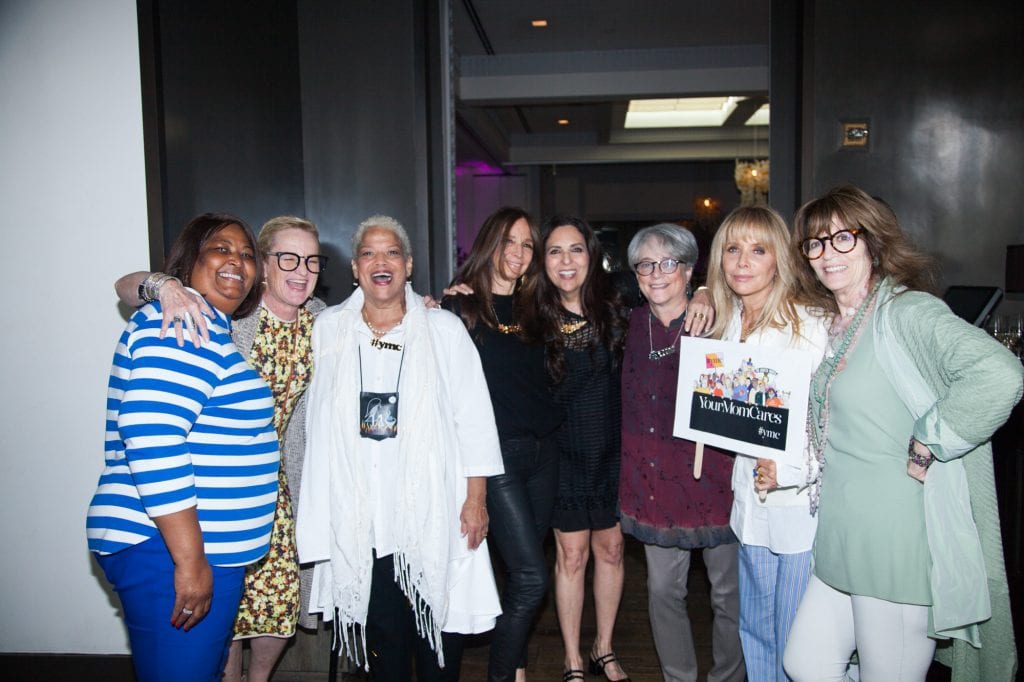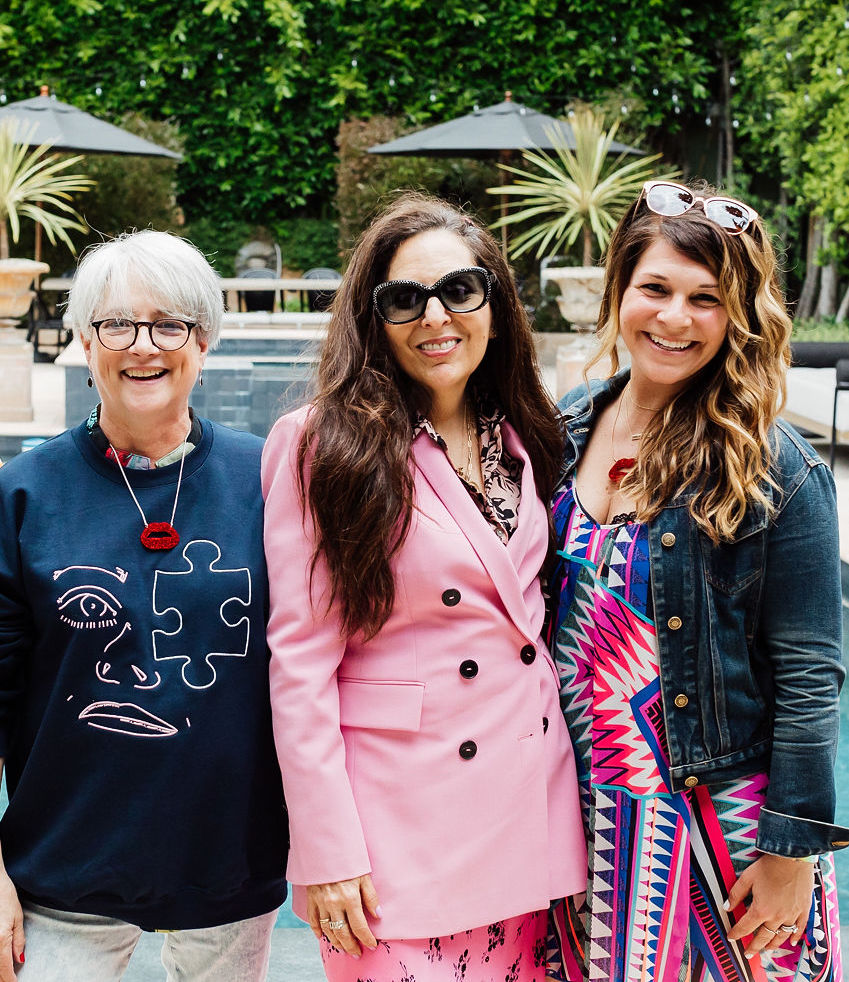
If mama ain’t happy, ain’t nobody happy.
Secure your own oxygen mask first so that you can help your child.
Your kids don’t want a perfect mom, they want a happy one.
There are plenty of quotes urging mothers to take care of themselves. But do we listen? Sharon Feldstein, Patsy Noah, Meredith Wolff and their gang at YourMomCares hope that this year, we will. That’s why they’ve put “Self-care for YOU, don’t ignore it” at the top of their back-to-school mental wellness checklist.
“More and more this year, because of the pandemic, we are hearing stories of extreme stress, anxiety and depression in caregivers,” says Wolff, the nonprofit’s COO. “Everyone is feeling a lot of pressure and uncertainty.”
The checklist, the second from YourMomCares, is put together by the organization’s “expert moms,” who are professionals in mental health or related fields such as education and nutrition. The annual list is just part of the mission of YourMomCares, a group of celebrity and influencer moms who have banded together to work to remove the stigma surrounding kids’ mental health.
Along with co-founders Feldstein (mom of Jonah Hill and Beanie Feldstein), Noah (mom of Adam Levine) and Terria Joseph (mother of Alicia Keys), the group’s core moms include the mothers of Michael B. Jordan, Chris Paul and Jimmy Kimmel. Some mothers on the list are, themselves, celebrities: Rosanna Arquette, Sara Gilbert and Katie Couric, to name a few. The genesis of the project was nothing less than a meeting at the White House.
In 2014, longtime friends Feldstein and Noah were part of a group of celebrity moms – and Michelle Obama – who filmed a public service announcement for the Affordable Care Act. “Michelle Obama ends it with, ‘We nag you because we love you. #YourMomCares,’” says Feldstein. “I thought, this is a fantastic brand, YourMomCares, and you need moms that have a voice.” With a background in branding, marketing and management, Feldstein was also familiar with the power of celebrity from her longtime work on a pediatric cancer research charity. “I’d be begging people in the spotlight, famous people, to help us spread the word,” she says. “But we have a built-in network to help us spread the word, aka our children. So, we have been given this voice and we have to use the voice for good.”
With permission from the White House, they trademarked the name a couple of years later and asked their kids what the YourMomCares cause should be. The verdict was mental health. “They were very interested in this particular cause as the cause of the day,” says Noah. “In the case of Adam, it might be because he became a father. Adam felt that this was the most important cause and kind of predicted how much this would bloom and blossom in the next few years. As we picked it, it felt new and it felt obviously very important and urgent, but it has become even more so since all of the events that have followed.”

Feldstein says the moms vetted several causes, including homelessness, food insecurity and education before making a final decision. “Mental health is part of health,” she says. “If you have cancer, you have anxiety about what’s going to happen to you. If you’re food insecure, you’re worried where your next meal will come from. If you’re homeless, you’re worried where you’re going to sleep. Adding COVID to the mix, we had an earthquake and now we have a tsunami of mental health issues in this country.”
That brings us back to this unprecedented school year and this unique back-to-school checklist. Most such checklists focus on physical needs and organizational issues. “You need notebooks and pencils and computers, and you need to have this on your schedule,” Wolff says. But families tend to overlook the simple ways they can tend to everyone’s mental health and this is where the YourMomCares checklist comes in. The items are mainly common sense and intuitive. “But putting the resource in front of people is a really effective way of helping them put the concept into practice in their homes,” says Wolff.
Some of the items – such as self-care for parents – are things we just tend to neglect. Others might not occur to parents. Tip nine suggests that moms and dads make sure their children have a trusted adult other than their parents to share feelings with because distance learning separates kids from the teachers and coaches who might otherwise naturally fill this role. “There are a lot of roles that a teacher or a coach might play in children’s lives,” says Wolff. “How do we cultivate that in an environment where going to school every day is not part of a child’s routine?”
Still other items, including helping nurture your child’s social connections and developing a daily routine, have always been a good idea but take on new urgency during the pandemic. “Another tip ties into thinking about adaptability and flexibility because what August or September looks like may not be what October or March looks like,” Wolff says. Also new this year is the suggestion to cultivate resilience and teach self-advocacy so that students understand how to advocate for themselves even in a distance-learning environment, and how to adapt and be resilient during this unusual school year.

There’s one version of the list, with just the 10 checklist items, that you could easily print and post on the refrigerator. For those who want to dive deeper, there are explanations for each item and tips for specific groups such as younger children, teens and kids with special needs. “We’re really trying to create a tool that has something for every parent, regardless of who your kid is and regardless of your learning environment,” says Wolff.
YourMomCares also has some long-term large-scale partnerships that reach across the U.S. and serve children in the L.A. area. One of those is with the nonprofit Children’s Health Fund, which works locally through Cedars-Sinai. “We have created the first ever children’s group therapy for homeless children on Skid Row in South L.A.,” says Feldstein. “Picture if you will: It’s a Wednesday night, kids in a homeless shelter, and there’s a therapist that comes in and brings them all together, shows them that they’re not alone, and even if the next day they are no longer in that shelter, they get a mental-health tool to put into their toolbox, take with them for the rest of their life. It’s a simple idea with wonderful results.”
YourMomCares also has a big-picture vision to ensure that everywhere Children’s Health Fund offers physical health services (which it does for nearly 4,000 children each year), it also offers mental-health services. “We made a commitment to fully fund mental-health services for their South L.A. program,” Wolff says.
Another partnership is with University of Pittsburgh Medical Center Children’s Hospital Foundation, where YourMomCares has funded a behavioral help app. The pediatrician-prescribed technology connects adolescents and young adults with a coach who guides them through exercises designed to help them deal with anxiety and depression. “The goal is that this child will learn to manage their anxiety and depression on their own through practice with their coach,” Wolff says, adding that data from a pilot study has been encouraging. Results of a full study will be available early next year.
To address urgent issues such as contaminated water in Flint, Mich., or the separation of migrant children from their parents at the U.S. border, YourMomCares has a Mobil Moms Fund. During the pandemic, that fund has helped address the needs of organizations supporting children in underserved areas. The moms also help raise awareness. “Because we have a good voice and because we have a good following, we raise awareness on social media and in other ways for these organizations that are doing such important work in the moment,” says Noah.
And there was no need for YourMomCares to pivot its longstanding mission to address current conditions. “We were already in the space, and in a sense, we were poised to help with COVID-19,” says Noah. “We were right there, and a lot of partners said thank goodness we were already doing this. Sadly, we were ahead of the curve.”
The organization welcomes participation from mothers of all sorts. Celebrity and influencer moms can lend their voices, moms (and others) can make cash donations and everyone can shop the YourMomCares selection of high-end products that give back. These opportunities, like the organization’s mission, will continue long after COVID-19 has been defeated.
“We’ve been working for underserved kids with mental health issues and insecurities since we started,” says Feldstein. “Our cause is just amplified by what’s going on in the world. We will continue to do this until we see a lot more smiles on a lot more kids.”
Because they care.
Christina Elston is Editor of L.A. Parent.


























